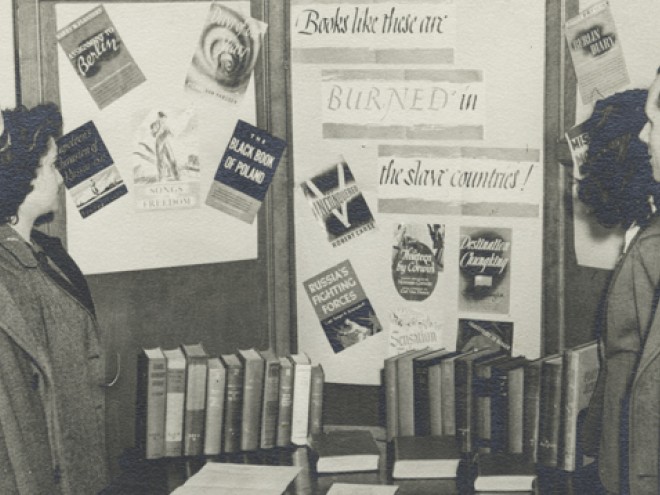Though written in a more playful style than one might expect, Glickman’s study is important for locating in one place a sufficiently thorough and eminently readable treatment of its subject. Glickman begins by setting his immediate subject into a few larger ones. These include the long association of Jewish culture and civilization with the written word, which stresses the primacy of scribed and printed text in shaping Jewish life and identity. The suggestion is that no other people would be as damaged as the Jewish people through the destruction of its literature, both sacred and profane.
Another important context developed by the author is the Nazi plundering of the larger category: all Jewish cultural production, notably including artworks. The annihilation of the Jewish people, under Hitler, required as well the disappearance or appropriation of its creative expression.
Glickman also provides a history of Jewish books and religious scrolls: their making over the centuries of changing materials and technologies, their methods of ownership and distribution, their privileged place in the transmission of peoplehood.
The heart of the book, of course, is the holocaust within The Holocaust. Rabbi Glickman traces the transition from destroying Jewish books to hoarding and hiding them. The raiding of homes, libraries, and Jewish institutions in general led to a dispersed accumulation of enormous numbers. However, even before the war was over, the effort to rescue and reclaim was underway. Jewish leaders recognized the need to rescue and rehouse the treasure of the Jewish mind, spirit and history.
Perhaps the most interesting material in Stolen Words has to do with the role of U. S. military forces and of specially established institutions for the rescue, repatriation, and allotment of Jewish books as part of rebuilding Jewish community life after WWII.
There are several heroes of this effort whose contributions Glickman treats in detail. These include Army Captains Seymour Pomrenze and Isaac Bencowitz; Salo Maron, who oversaw the system-building that would “determine the fate of millions of Europe’s Jewish cultural treasures,” including books, and such instrumental figures as Judah Leon Magnes, Cecil Roth, and Hannah Arendt.
Rabbi Mark Glickman’s vivid and meticulous presentation of these efforts, instrumental to cultural continuity in what he calls the “New Jewish Landscape,” will be a revelation to most readers.
This book is a must-read for every Jewish library and every university library as well.
Acknowledgments, afterword, index, introduction, notes.
Related Content:
Rabbi Mark Glickman’s Visiting Scribe Posts
Philip K. Jason is professor emeritus of English at the United States Naval Academy. A former editor of Poet Lore, he is the author or editor of twenty books, including Acts and Shadows: The Vietnam War in American Literary Culture and Don’t Wave Goodbye: The Children’s Flight from Nazi Persecution to American Freedom.





